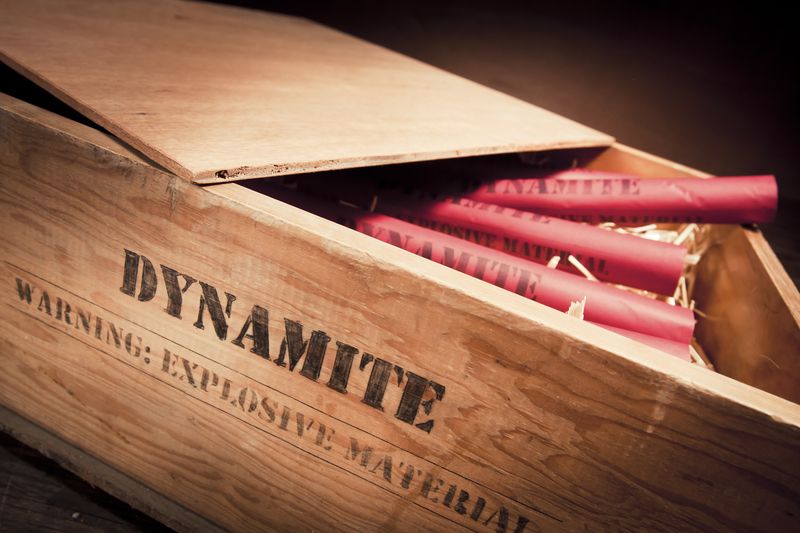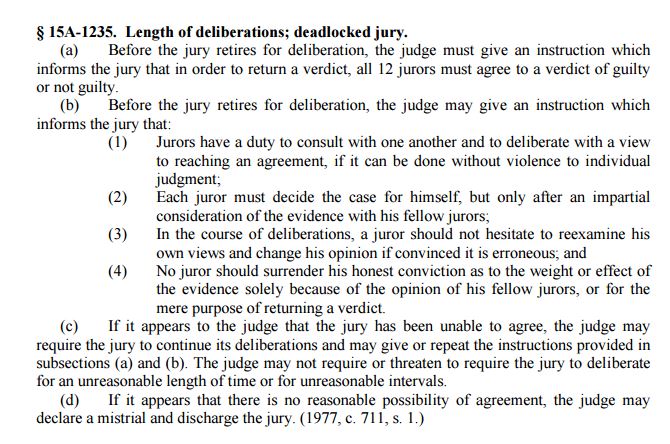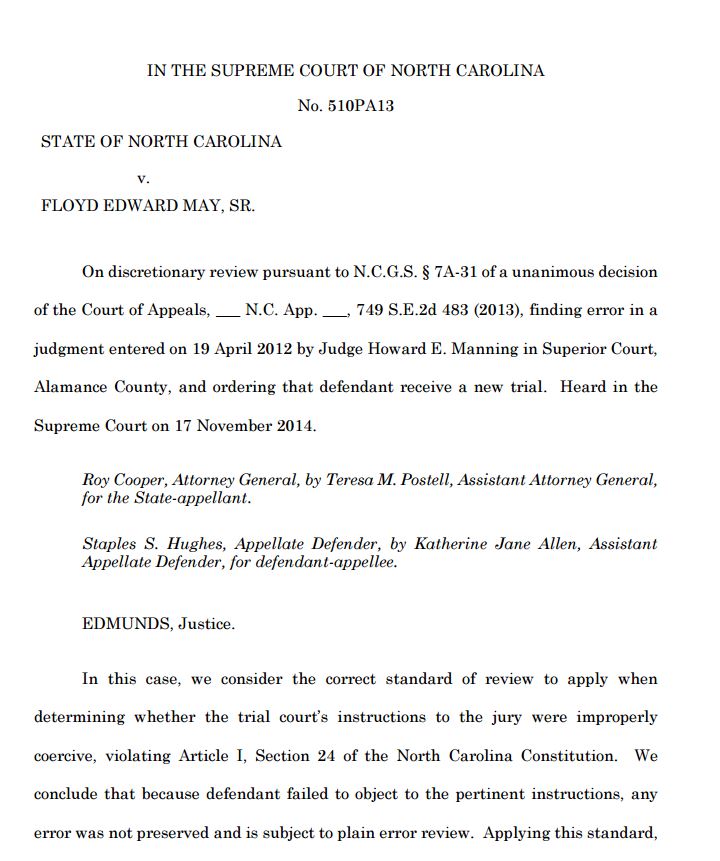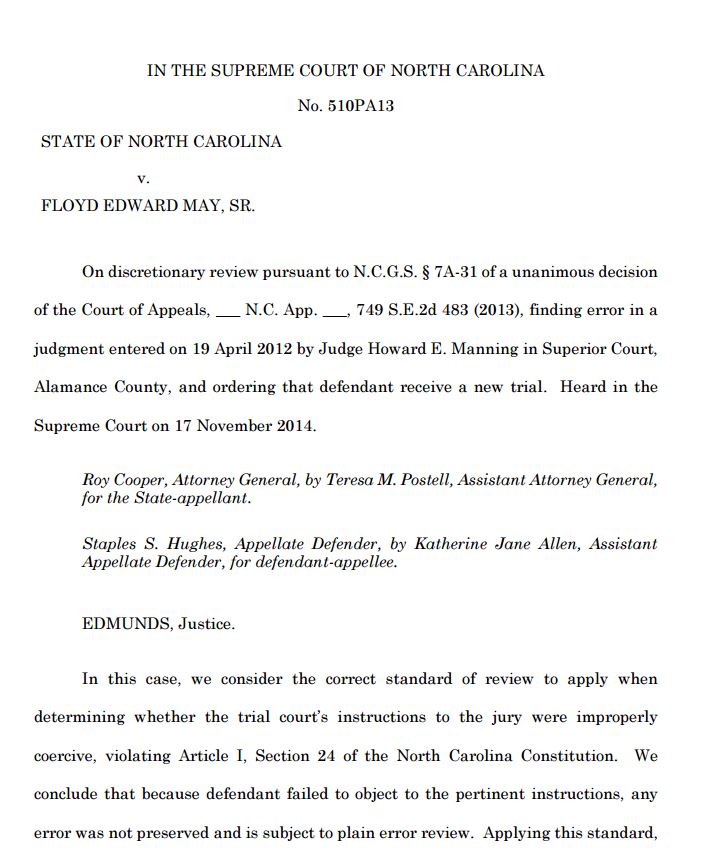Hung, Deadlocked Jury Dynamite Charges: Jury Deliberations in North Carolina
Caselaw Summary for North Carolina Supreme Court – North Carolina v. May
North Carolina Supreme Court: EDMUNDS, Justice. Justice ERVIN took no part in the consideration or decision of this case.
On discretionary review pursuant to N.C.G.S. § 7A-31 of a unanimous decision of the Court of Appeals, ___ N.C. App. ___, 749 S.E.2d 483 (2013), finding error in a judgment entered on 19 April 2012 by Judge Howard E. Manning in Superior Court, Alamance County, and ordering that defendant receive a new trial.
Ruling:
Defendant has failed to establish that the trial court plainly erred in its jury instructions. Accordingly, we reverse the holding of the Court of Appeals to the contrary. REVERSED
- Defendant did not raise a contemporaneous objection when the instruction was given
- Wilson distinguishable from the case at bar
- Supreme Court carefully constrained the breadth of the holding in Wilson so that not all violations of Article I, Section 24 are deemed preserved
- General rule is that “failure to raise a constitutional issue at trial generally waives that issue for appeal.”
North Carolina Constitution – Article I, Section 24
Sec. 24. Right of jury trial in criminal cases
No person shall be convicted of any crime but by the unanimous verdict of a jury in open court, except that a person accused of any criminal offense for which the State is not seeking a sentence of death in superior court may, in writing or on the record in the court and with the consent of the trial judge, waive jury trial, subject to procedures prescribed by the General Assembly. The General Assembly may, however, provide for other means of trial for misdemeanors, with the right of appeal for trial de novo. (2013-300, s. 1.)
Plain Error Analysis
- Under plain error review, a defendant must demonstrate that the trial court committed a fundamental error
- Requires reviewing the record in its totality and determining that the prejudice to the defendant had a probable impact on the jury’s finding of guilt
- Only in exceptional cases in which the error is one that seriously affects the fairness, integrity or public reputation of judicial proceedings
- Must analyze the trial court’s actions in light of the totality of the circumstances facing the trial court at the time it acted
What is a Deadlocked or Hung Jury
A “deadlocked” or “hung” jury is so irreconcilably divided in opinion that they cannot agree upon a verdict. In North Carolina, criminal offenses require a unanimous verdict.
- No error arises when the essence of the instructions was merely to ask the jury to continue to deliberate without being coercive
- Careful preservation of issues necessary for Appellate review
What is a Dynamite Charge?
A “Dynamite Charge” is a jury instruction intended to prevent a hung jury by encouraging jurors in the minority to reconsider. It is occasionally given when, after deliberation, a jury reports that it is deadlocked and unable to decide on a verdict.
The term is based, in part, from an 1896 United States Supreme Court Opinion entitled Allen v. United States.
Its intent is to jurors from entrenched positions, an is sometimes referred to as the “dynamite charge” or “hammer charge.“
While undoubtedly the verdict of the jury should represent the opinion of each individual juror, it by no means follows that opinions may not be changed by conference in the jury room. The very object of the jury system is to secure unanimity by a comparison of views, and by arguments among the jurors themselves. It certainly cannot be the law that each juror should not listen with deference to the arguments and with a distrust of his own judgment if he finds a large majority of the jury taking a different view of the case from what he does himself. It cannot be that each juror should go to the jury room with a blind determination that the verdict shall represent his opinion of the case at that moment, or that he should close his ears to the arguments of men who are equally honest and intelligent as himself.
North Carolina Court of Appeals – Coercive Instruction by Court – Error
North Carolina Court of Appeals:
North Carolina v. May – N.C. Ct. App. 2013
DILLON, Judge. Judge ELMORE and Judge GEER concur. NEW TRIAL
NOTE: The North Carolina Supreme Court, in its discretion, reviewed the case and overturned the unanimous decision of the Court of Appeals. Given the significance of the historical proceedings and the turning of the case on technical grounds, one would be well-served in reviewing the logic and distinctions in the caselaw between the Court of Appeals and Supreme Court.
Of additional interest, and to some extent editorial comment, is that the North Carolina Supreme Court did not directly address the propriety of the Trial Court’s instructions to the Jury.
Assuming without deciding that the court’s instruction to continue deliberations for thirty minutes and the court’s isolated mention of a retrial were erroneous, these errors do not rise to the level of being so fundamentally erroneous as to constitute plain error
The opinion is largely based on a technical failure to formally object to the Trial Court’s supplemental comments and/or instruction regarding the Deadlocked Jury. With such distinction, the Supreme Court opined the Constitutional Issue was not properly preserved and utilized a “Plain Error” analysis.
One would be remiss in failing to ask, “What would have happened had the issue been preserved?” At issue, in part, is the following language from the Trial Court:
I mean, I can’t tell you what to do. I appreciate your note letting me know, but I’m going to ask you, since the people have so much invested in this, and we don’t want to have to redo it again, but anyway, if we have to we will.
In reviewing the matter on appeal, the North Carolina Court of Appeals set forth:
We agree with Defendant that the trial court’s third charge violated N.C. Gen.Stat. §15A–1235. For instance, when the trial judge was informing the jury that he was requiring them to deliberate for an additional thirty minutes, he erred by stating, “I’m going to ask you, since the people have so much invested in this, and we don’t want to have to redo it again, but anyway, if we have to we will.” Our Courts have held that instructing a deadlocked jury regarding the time and expense associated with the trial and a possible retrial constitutes error. See State v. Lipfird, 302 N.C. 391, 276 S.E.2d 161 (1981); State v. Easterling, 300 N.C. 594, 268 S.E.2d 800 (1980); see also State v. Pate, 187 N.C.App. 442, 653 S.E.2d 212 (2007); State v. Burroughs, 147 N.C.App. 693,556 S.E.2d 339 (2001); State v. Johnson, 80 N.C.App. 311, 341 S.E.2d 770 (1986); State v. Lamb, 44 N.C.App. 251, 260, 261 S.E.2d 130 (1979).
In Easterling, our Supreme Court noted that prior to the passage of N.C. Gen.Stat. § 15A–1235 in 1978, “the general rule [was] that a trial judge may state to the jury the ills attendant upon disagreement including the resulting expense … and that the case will in all probability have to be tried by another jury in the event that the jury fails to agree.” Id. at 607, 268 S.E.2d at 808 (quoting State v. Alston, 294 N.C. 577, 594, 243 S.E.2d 354, 365 (1978)). The Court then stated that it was the Legislature’s intent, with the passage of N.C. Gen.Stat. § 15A–1235 in 1978, that “a North Carolina jury may no longer be advised of the potential expense and inconvenience of retrying the case should the jury fail to agree.” Id. at 608, 268 S.E.2d at 809.
Further, as argued by Defendant, we believe the trial court erred in referencing only a portion of the four-part instruction contained in N.C. Gen.Stat. § 15A–1235(b) during its third charge. Though, pursuant to N.C. Gen.Stat. § 15A–1235(c), a trial court is not required to give a re-instruction under subsection (b) to a deadlocked jury; however, “[w]hen[ ] a trial judge gives a deadlocked jury any of the instructions authorized by N.C.G.S. § 15A–1235(b), he must give them all.” State v. Aikens, 342 N.C. 567, 579, 467 S.E.2d 99, 106 (1996) (emphasis added) (citation omitted).
Bill Powers
2412 Arty Avenue
Charlotte, North Carolina 28208
704-342-4357
https://www.carolinaattorneys.com/
bill@PowMac.com
Bill Powers has been listed in 2016 SuperLawyers North Carolina Magazine. In calendar years 2012, 2013 & 2014, SuperLawyers further included Bill in the “Top 100” Lawyers in North Carolina. In 2013 Bill was listed as “Top 25 in Charlotte” by SuperLawyers North Carolina.
For Membership Information & Criterion for Inclusion to SuperLawyers North Carolina see: https://www.superlawyers.com/north-carolina/lawyer/Bill-Powers/ccf452c7-eeb6-4f0e-98e4-337804e043e8.html
Powers Law Firm PA in 2016 has been again listed as a “Best Law Firm” by U.S. NEWS & WORLD REPORT. For Member Info & Criterion for Inclusion see: https://bestlawfirms.usnews.com/profile/powers-mccartan-pllc/overview/44550

In 2016 Bill Powers has been included in Best Lawyers of America. For membership info & criterion for inclusion see: https://www.bestlawyers.com/lawyers/bill-powers/78562/

Bill Powers has also been listed in “Top 100 Criminal Defense Lawyers in North Carolina” by The National Trial Lawyers. For member info & criterion for inclusion see: https://www.thenationaltriallawyers.org/profile-view/Bill/Powers/5071/
 Carolina Law Blog
Carolina Law Blog f
f

